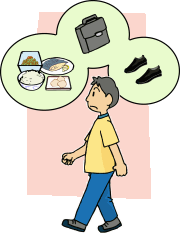いま、1型糖尿病は
2009年02月06日
44 Roughly "Estimate"

We actually "estimate" every day
We actually "estimate" something all the time. For example, when we go to a department store or a shop, we "estimate" how much the sales price of something is or imagine how much we are willing to pay for something.
Whether you are a student or a company employee, you must be thinking on your way to school or office what is happening today and working out a plan for the day such as how you are going to call on important customers.
We also "make an estimate" about our physical condition
When we wake up in the morning, we all must be checking our physical condition. Don't I have a fever? I have a sore throat! How is my shoulder? How is my lower back? I guess I don't have a headache etc. If we have a fever, we may try to find where we can cut corners. If our lower back feels heavy, we may modify the plan for the day by reducing the number of customers to visit on that day. If we find it impossible to make such changes to the plan, we may seek someone's help or postpone the work to the following day.
In this way, we "make an estimate" about our half-day or full-day plan.
Likewise, "make an estimate" of blood glucose
Let's suppose you just measured your blood glucose level. Instead of reacting to the value "right away" and injecting additional insulin or thinking how many units of insulin to inject if it is before meal, let's think how the rest of the day is going to be and decide the amount of insulin based on that.
Let's try to estimate how your blood glucose will be before meal. For example, "If I inject XX units of insulin now, maybe I will not be hypoglycemic or hyperglycemic until before the next meal. Well, I am going out this afternoon and will be walking a lot, so my blood glucose may become low." In other words, this is the same as roughly imagining how the rising curve of your blood glucose will be based on what you are about to eat.
Make modifications from the next time
At first, what you "estimate" may be wrong. That is fine. The more you get it wrong, the better. It is because it will help you think differently such as "Maybe I should add two units next time" or "It may be better to have it reduced by one unit."
You will gain various experiences through such trial and error, and they will all become irreplaceable assets for you. One who has made many mistakes has many such assets. Such person can naturally come up with what to do without panicking even when lifestyle pattern changes abruptly.
On sick days, such person can act flexibly because of accumulated experiences instead of thinking "what should have been done". There are many patients who have learnt how to deal with sick days but end up panicking not knowing what to do on sick days.
You will be able to learn naturally how to cope with sick days by trial and error in your daily life.
In other words, once it becomes a habit to "estimate", you will be able to treat a sick day as just another day with different pattern as opposed to a special day and will not panic.
Learn how to deal with unordinary events than remembering sick day rules
"Sick day rules apply to sick days only." Do you not think this way treating sick days as something special and look away from them? It is only about once in a year that you get a fever, so it is actually difficult to remember sick day rules. As long as you know the nature of sick days, you will be able to manage, which I think I may have written some other place.
Coping with unordinary events - this happens more frequently than sick days. If you have something unordinary that happens often in your daily life, I would suggest asking your doctor what to do to deal with such unordinary events and if actions you have been taking to cope with such events are right.
©2009 Yasuko Uchigata
ざっくりと「見計らい」する

実は我々はいつも「見計らい」しています。デパートやお店にいったら、今だったらセールでいくら位かな、いくらなら買おうかなと「見計らい」しています。
学校でも、会社でも、今日は何があるんだっけ、今日はお得意さん廻りだとか、今日1日の段取りを考えて、毎朝、通学、通勤するはずです。 体調についても「見計らい」しています
朝起きたときに、熱があるのでは?とか、のどが痛い!などはもちろんのこと、肩の調子はどうだとか、腰の調子はどうだとか、頭痛はしていないかとか、かならず、自分の体調をチェックしているでしょう。
もし、熱があったら今日の段取りはどこを手抜きしようかとか、腰が重いのでお得意さんまわりは少し減らそうかとか、段取りを変更しますね。そして、そのような変更が無理そうならだれか助っ人を頼んだりするかもしれません。明日に延期するかもしれません。
というように、半日や、全日の「見計らい」をしています。 同じ「見計らい」を血糖値に対しても
血糖値を測定したと仮定してみましょう。測定したなら、血糖値を得たなら、その値に“すぐ”反応してインスリン注射を追加するとか、食前ならインスリン注射量をいくつにしようかと考えるのではなくて、「これからの段取りはどうなっていたっけ、ならばインスリン注射量はいくつにしようか」というように、考えてみましょう。
たとえば食前、「これから××単位注射したら、次の食事前まで低血糖にもならずに、ひどい高い血糖値にもならないかな、いや今日の午後は外出してよく歩くから低くなるかな」というように、「見計らい」をしてみましょう。つまり、これから食べるものによる血糖上昇曲線を、ざっくりと考えてみる、ということです。 次から修正していきます
最初は、「見計らい」が間違うことと思います。それでいいのです。間違うほどいいのです。間違うと「次には2単位増やしてみようか」とか、「1単位減らしておいたらいいかも」という次のアイデアがでてきます。
そうやって、試行錯誤して、だんだん経験を積んでいきます。これが全部自分の財産になります。失敗する人ほど、多くの財産をもっているのですね。そして、生活パターンが急に変更になっても、びっくりせずに、こうやればいいのだ、というアイデアが自然に浮かんできます。
シックデイのときに、「どうすれば良かったかな」と考えるのではなく、多くの財産があるから、シックデイに臨機応変に対応ができるのですね。シックデイの対応を学んでいても、そのときになるとパニックになって、わからなくなったという方が多いのですね。
シックデイの対応は平生の試行錯誤をしていれば、おのずとわかってきます。
つまり、いつもこのような「見計らい」の考えをしていますと、シックデイは特別な日のことではなく、いつもと違うパターンの日のことと受け取ることができ、パニックにもなりません。 シックデイルールよりも普通でない日の対応を!
「シックデイルールはシックデイの日だけのことだ」と考えて、特別の日のことと思って、頭のなかで避けていることはないですか。熱がでるなど、年に1回くらいしかないのですから、シックデイルールを覚えていることは実は困難なことなのですね。本質だけを知っていればできることなのですが、どこかに書いたような・・・
普通でないことが起こったときの対応、これのほうが、頻度が高いのです。自分の生活のなかでよく起こる、普通でないことことがあれば、ぜひ先生に、どうすればいいのか、自分はこれまでこのように対応しているがこれでいいのかを聞いてみてください。
※ヘモグロビンA1c(HbA1c)等の表記は記事の公開時期の値を表示しています。
Copyright ©1996-2024 soshinsha. 掲載記事・図表の無断転用を禁じます。
治療や療養についてかかりつけの医師や医療スタッフにご相談ください。

 医療・健康情報グループ検索
医療・健康情報グループ検索